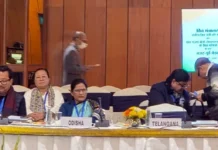JEMEITHANG, 20 Nov: As part of the NITI Aayog’s ongoing collaboration with the Government of Arunachal Pradesh under the Aspirational Blocks Programme (ABP), Jemeithang in Tawang district has been identified for development as a model village.
In this connection, a stakeholders’ consultation workshop was organised near the historic Gorzam stupa, in coordination with the district administration and the Indian Army.
The workshop focused on developing a comprehensive roadmap for transforming Jemeithang, with discussions centred around livelihood enhancement, infrastructure improvement, and promotion of ecotourism.
The NITI Aayog delegation was led by Programme Director K Narayanan, while the district administration was headed by Tawang Deputy Commissioner Namgyal Angmo. The Indian Army was represented by Jemeithang Brigade Deputy Commander Colonel HS Dhillon.
Speaking on the occasion, Narayanan highlighted Jemeithang’s “innate spirit of peace and natural beauty,” praising the younger generation for preserving its rich culture and traditions. He reiterated the NITI Aayog’s commitment to supporting Jemeithang’s emergence as an important tourist destination, and invited suggestions from villagers and stakeholders to shape its development as an aspirational model village.
The DC provided an overview of Jemeithang’s progress under the aspirational block framework, emphasising ongoing initiatives involving self-help groups and community participation. She noted that Jemeithang is already on a strong developmental trajectory, with significant potential in the tourism sector, including cultural assets such as the Gorzam Kora festival and local heritage sites.
NITI Aayog state nodal officer Dr Darpajit Sengupta elaborated the vision of the ABP, its framework, and the Aakansha initiative.
Jemeithang Assistant Commissioner Deewan Marapresented key insights into the demographic, infrastructural, and socioeconomic landscape of the region.
Col Dhillon shared details on Army-led community initiatives, dual-use infrastructure projects, BRO coordination, and civil-military cooperation in the area.
NITI Aayog’s non-resident fellow Dr Rajiv Bhartari emphasised the importance of eco-sensitive planning in fragile mountain terrain, watershed management, and the use of local materials and nature-based development solutions.
Representatives from the WWF, Shocktsen village GB Sangey Tsetan, and local youth representative Tenzin Tsongyal Gyamo also contributed valuable suggestions during the deliberations.
The workshop marked another significant step towards transforming Jemeithang into a vibrant, self-sustaining model village, underlining the collaborative spirit of the community, the administration, and national institutions. (DIPRO)

